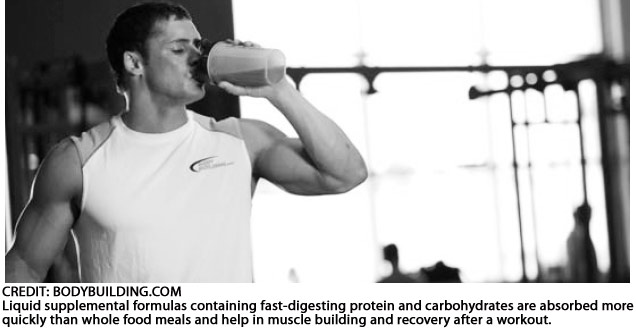Fun and Fitness: Choose liquids over solids for your post-workout

Nutritionists and professionals alike typically state that whole foods always trump supplemental nutrition. The problem is that "always" is never the case, especially when considering that it's not always possible to eat whole foods. While it is true that traditionally complete, untreated and unprocessed whole food should form the basis of any nutritional regimen, there are some instances in which supplements can actually be superior to whole food. In the case of post-exercise nutrition, it can be argued that liquid supplemental nutrition is superior to whole food for a number of reasons.
Typically, after intense exercise, most people complain that eating a big meal is difficult. This is understandable as the exercise stress creates a situation where the hunger centres are all but shut down. However, as you now know, it's absolutely critical that you eat if you want to remodel the muscle, enlarge the muscle or recover from the exercise.
Fortunately, liquid supplemental formulas are easy to consume and can be quite nutrient-dense, providing all the nutrition you need at this time. In addition, since these formulas are structurally simple, most of us don't have any issues processing them in our gastrointestinal tracts. Your stomach will thank you for this.
Plenty of research has demonstrated that liquid supplemental formulas containing fast-digesting protein and carbohydrates are absorbed more quickly than whole food meals.
To put this into perspective, a liquid post-exercise formula may be fully absorbed within 30 to 60 minutes, providing much-needed muscle nourishment by this time. A solid-food meal may take two to three hours to fully reach the muscle.
The faster the protein and carbohydrates get to the muscle, the better your chances for muscle building and recovery. Current research has demonstrated that subjects receiving nutrients within one hour after exercise recover more quickly than subjects receiving nutrients three hours after exercise. Liquid nutrition is making more sense, isn't it?
However, it's important to note that this doesn't mean liquid nutrition literally replaces post-meals! Think of it as post-meal insurance for ensuring that you always get the required nutrition until you get home to those whole foods. It's an important rule of thumb to ensure that you get that actual meal within the hour after a training session. You need to combine the best of both worlds to feed your starving muscles and system for full recovery. Only then will you have truly refueled the tank and maximized your workout!













